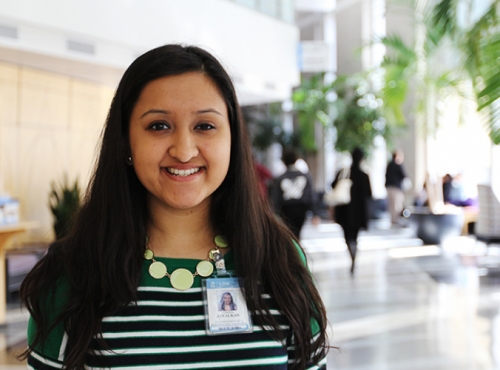Karina Javalkar has spent the last three years as an undergraduate researcher in the UNC Health Care Transition Program. Under School of Medicine professor Maria Ferris, Javalkar studies the transition from pediatric to adult care for adolescents and young adults with chronic illnesses, especially chronic kidney disease.
End-stage renal disease is one example. It’s a chronic illness that affected 7,522 children in the United States in 2012, according to the United States Renal Disease Data System. We asked Javalkar what she has learned about improving health care for people with diseases like these, and what she’s learned about herself through the process.
Why is transition research important?
Imagine growing up with a chronic illness. You take five to ten medicines every day, you might be on dialysis, you feel sick a lot, and you go to the doctor frequently. You were diagnosed with this disease when you were so little, you do not know anything else. Your parents are helping you a lot.
Patients get settled into that, and when they get older they need to be learning how to self-manage their disease. They are going to be moving away, going to college, going to work on their own. Any child that grows up with a chronic illness could benefit from transition preparation. It is really important in keeping these patients healthy.
What kind of chronic diseases do you study?
Because we work primarily in the nephrology clinic, it’s adolescents and young adults with chronic kidney disease. We have expanded and recruited patients from different clinics, such as patients with inflammatory bowel diseases, sickle-cell anemia, type 1 and type 2 diabetes. We partner with other pediatric providers at UNC that are interested in transition.
What do you enjoy about research?
Interacting with and getting to know patients throughout the past three years. When you see a patient getting sick frequently or someone who is struggling to take their medicine, it motivates you more to do the research and look at different factors that might be affecting their transition readiness.
Two years ago we were doing a study for young adults in the pediatric clinics. Sometimes I would interview somebody in the adult clinic who had already transitioned, and it was awesome that I got to see how successful their transition was.
What role do you play in the research?
I do stats and data analysis. I write papers. Mostly I recruit patients for the studies. So, I go into clinics or to the inpatient rooms and talk to the patients and their families about the study that we are doing and then administer whatever surveys that we are looking for from them.
What factors do you study in transition research?
Basic demographics have always been really important: how many parents are in the household, age, gender, socioeconomic status, type of insurance, and seeing which of those people know more about their disease, their medicines—which of those people are able to take care of themselves.
For example, in our studies we have found that females usually score higher on our transition readiness scales, and are usually better prepared to transition, than males. Patients who are older and patients who have public insurance have more emergency visits and hospitalizations than those who are younger and those with private insurance.
Have you been able to do any other kind of research?
With the generous support of the Burch Fellowship and the Mahatma Gandhi Fellowship, I was able to go to India. My research project was looking at adult patients with type 2 diabetes. I was interested in it because my grandmother had type 2 diabetes when she lived in India, and I saw some of the challenges she faced in knowing about her disease. I wanted to look into the different factors that went into a patient’s knowledge and self-management.
I lived there for almost two months, and I was interviewing patients and trying to learn what was impacting their ability to care for themselves. I saw patients who were rickshaw drivers by day and food-stall operators by night, so they had no time to exercise or follow a diet.
You will be attending medical school. Did your undergraduate research experiences play a role in your decision?
I was not originally thinking about medical school. I was really interested in public health and health administration. Working with patients, shadowing Dr. Ferris, and working with a multidisciplinary team is where the switch happened. All three of those things are what a physician gets to do.


